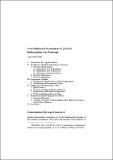|
Reseña:
|
Reseña:Judicial independence constitutes one of the fundamental principles ofthe German Constitution.1 The status and structure of the judiciary isJudicial independence constitutes one of the fundamental principles ofthe German Constitution. The status and structure of the judiciary iselaborated in Chapter XI (Articles 92-104) of the Constitution, the socalledBasic Law (“Grundgesetz”). Article 97 guarantees the independenceof judges. It reads: (1) Judges shall be independent and subject only to the law.(2) Judges appointed permanently to full-time positions may be involuntarilydismissed, permanently or temporarily suspended, transferred,or retired before the expiration of their term of office onlyby virtue of judicial decision and only for the reasons and in themanner specified by the laws. The legislature may set age limits forthe retirement of judges appointed for life. In the event of changes inthe structure of courts or in their districts, judges may be transferredto another court or removed from office, provided they retain theirfull salary. This guarantee applies to federal and state (“Land”) judges alike sincethe German judiciary is mixed, being composed of state and federalcourts. While the highest courts are federal courts, the courts of firstinstance and courts of appeal are state courts. As a general rule, judgementsfrom the highest state courts may be appealed to the supremefederal courts provided they concern significant cases. Judicial independenceof state judges is also guaranteed by the constitutions of the states which copy verbatim or analogously repeat Article 97 (1) BasicLaw.The legal status of federal and state judges is specified in federal laws,namely the “Federal Judges Act” (“Deutsches Richtergesetz”: DRiG)and the “Judicature Act” (“Gerichtsverfassungsgesetz”: GVG) which,along with other legal acts, provides the basis for procedural law inGermany. Both acts reproduce almost verbatim Article 95 (1) BasicLaw and provide for specific safeguards of judicial independence. Withrespect to state judges this law only provides for framework provisions.Their legal status is set out in the various state constitutions and furtherregulated by special state laws pursuant to paragraph 3 of Article 98 BasicLaw. |

